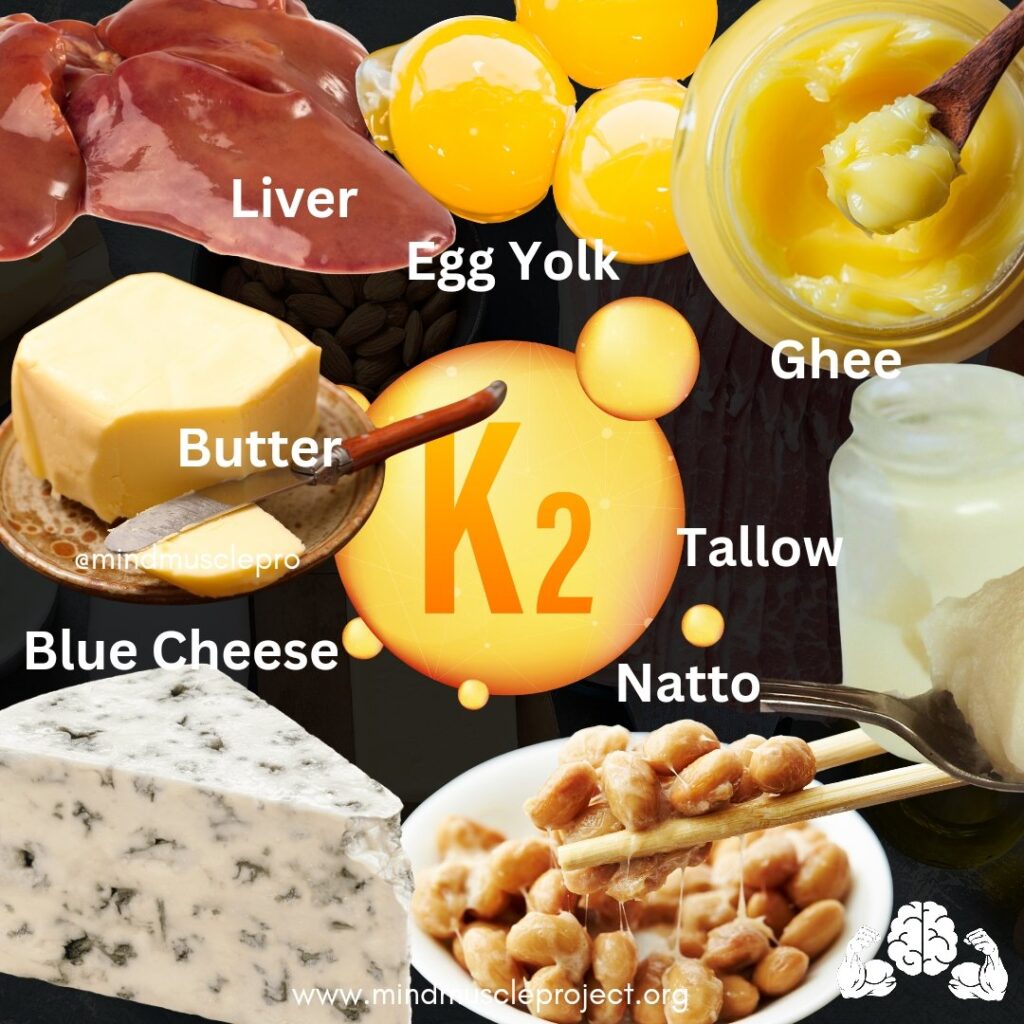When you hear “Vitamin K,” you probably think about leafy greens and blood clotting. But there’s much more to this essential nutrient—especially its lesser-known form, Vitamin K2. While Vitamin K1 plays a critical role in blood clotting, Vitamin K2 serves a completely different and equally vital function: managing calcium in the body to support bone, dental, and cardiovascular health.
In this blog post, we’ll dive into the importance of Vitamin K2, its functions, sources, and why you might need more of it in your diet or supplement routine.
What is Vitamin K? #
Vitamin K is a family of fat-soluble vitamins with two primary forms:
- Vitamin K1 (Phylloquinone): Found in leafy greens, K1 is crucial for blood clotting.
- Vitamin K2 (Menaquinone): Found in animal-based and fermented foods, K2 is essential for calcium regulation in the body.
Vitamin K1: The Familiar One #
- Critical for blood clotting.
- Found abundantly in green vegetables like spinach, kale, and broccoli.
- Deficiency is rare because most diets provide enough K1.
Vitamin K2: The Overlooked One #
- Less associated with blood clotting and more focused on moving calcium to the right places in the body.
- Deficiency is common, yet symptoms are often subtle, leading to underdiagnosis.
Why Vitamin K2 is Crucial #
Vitamin K2 activates specific proteins that guide calcium to where it’s needed (bones and teeth) and away from where it could be harmful (arteries and soft tissues). Without adequate K2, calcium may end up in the wrong places, increasing the risk of serious health issues.
Key Benefits of Vitamin K2 #
- Stronger Bones and Teeth:
- Activates proteins like osteocalcin, which bind calcium to bones, improving density and strength.
- Prevents dental cavities by ensuring calcium is deposited in teeth.
- Heart Health:
- Removes calcium from arteries, reducing the risk of calcification and cardiovascular disease.
- Improved Brain Function:
- Supports healthy brain aging and cognitive performance.
- Better Insulin Sensitivity:
- Helps regulate blood sugar levels, reducing the risk of metabolic syndrome and diabetes.
- Cancer Prevention:
- Emerging research suggests K2 may play a role in reducing the risk of certain cancers.
Why is Vitamin K2 Deficiency So Common? #
Unlike Vitamin K1, which is easy to obtain from a typical diet, Vitamin K2 is harder to come by. Here’s why:
- Dietary Sources Are Limited: K2 is primarily found in certain animal-based and fermented foods, which are not staples in most modern diets.
- Gut Conversion is Inefficient: While gut bacteria can convert K1 into K2, this process is highly inefficient, especially for those with poor gut health—a common issue today.
- No Storage Mechanism: K2 is not stored in significant amounts in the body, meaning it must be consumed regularly through diet or supplements.
Best Sources of Vitamin K2 #
If you want to ensure you’re getting enough Vitamin K2, focus on the following foods:
Animal-Based Sources #
- Liver: A nutrient powerhouse.
- Egg Yolks: Rich in K2, especially from pasture-raised hens.
- Butter, Ghee, and Tallow (Grass-Fed): Grass-fed is key because only grass-fed animals convert K1 into K2.
Fermented Foods #
- Natto: A traditional Japanese fermented soybean dish, one of the richest sources of K2.
- Certain Cheeses: Hard and aged cheeses like Gouda and Brie are excellent sources.
When Diet Falls Short: Supplements #
- Forms of K2 Supplements:
- MK-4: Synthetically derived, shorter half-life in the body.
- MK-7: Extracted from natto, longer half-life, potentially more effective for supplementation.
Vitamin K2 and Its Synergy with Vitamin D #
One of the reasons Vitamin K2 is so critical is its partnership with Vitamin D. These two vitamins work together to optimize calcium metabolism:
- Vitamin D3: Boosts the production of osteocalcin, a protein essential for binding calcium.
- Vitamin K2: Activates osteocalcin, ensuring calcium is effectively deposited in bones and teeth.
This synergy explains why many supplements combine Vitamin D3 and K2 for maximum effectiveness in maintaining bone density and cardiovascular health.
How to Ensure Adequate Vitamin K2 Levels #
1. Prioritize Dietary Sources #
Incorporate K2-rich foods like grass-fed butter, egg yolks, liver, natto, and aged cheeses into your meals.
2. Consider Supplementation #
If your diet falls short or you have higher needs (e.g., older adults, those with poor gut health), a K2 supplement can be a good option. Look for products containing MK-7, as it stays in the body longer.
3. Pair with Vitamin D #
For optimal calcium regulation, make sure you’re also getting enough Vitamin D3, whether through sunlight, diet, or supplements.
Key Takeaways #
- Vitamin K2 is essential for directing calcium to the right places, like bones and teeth, and keeping it away from arteries and soft tissues.
- Deficiency is common, and symptoms are often subtle, making dietary focus or supplementation crucial.
- Best sources include: Grass-fed animal products, fermented foods like natto, and high-quality supplements.
- Vitamin K2 works synergistically with Vitamin D, making them a powerful pair for bone and cardiovascular health.
If you’re not consuming enough Vitamin K2 through food, it’s a good idea to consider adding it to your supplement stack—especially if you’re already taking Vitamin D3. Together, they ensure your calcium is working for your health, not against it.





